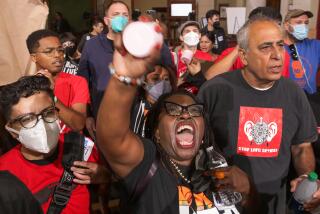To the Mayor’s Thinking, There’s No Excuse for Success
- Share via
Late last week, I asked Mayor Richard Riordan the question of the day.
Is it true what a lot of African American leaders are saying about you, that you’re unsympathetic, even hostile, to blacks?
“Total and complete bullshit,” he said. “I’m more relaxed among average blacks and Latinos than with anyone else. I go down there [in African American and Latino neighborhoods] to visit schools, women kiss me, hug me. Hell, I’ve devoted 15 years of my life to projects in south L.A.”
I asked him about his race relations because, in L.A.’s overheated political dialogue, the mayor is being painted as an enemy of the black community. By playing the race card, his foes are meeting with considerable success. Their story line is perfect for a media always on the alert for racial tension in this edgy city: Rich white guy mayor in his 60s can’t, or won’t, get along with blacks.
The milestones in the battle are well known: The white mayor has been critical of one top black official, Los Angeles Police Chief Willie L. Williams. He orchestrated the firing of another, Franklin White, chief executive officer of the Metropolitan Transportation Authority. Riordan vetoed a plan by Councilman Mark Ridley-Thomas for a government subsidized housing and commercial development at 81st Street and Vermont Avenue in South-Central, an action that was embarrassingly overturned by the City Council.
Finally, Riordan was excoriated at a Martin Luther King Jr. memorial by state Sen. Diane Watson, an African American, who demanded that the mayor give the black community “your concern, your passion, your sensitivity.”
I’ve covered most of the events, and I have a different take on the situation.
*
First of all, you’ve got to understand Riordan. He’s like a lot of people you’ve worked for, a real Mr. No Excuse.
When he tells you to do something, he wants it done--now. He doesn’t want to hear about how tough the job is, or the obstacles you face in accomplishing it. He doesn’t even want to hear that it’s a bum idea. His attitude is, “Don’t give me excuses. Just do it.”
That’s not the City Hall way. In City Hall, the first step is always to look for reasons you can’t do it.
That helps explain Riordan’s troubles with Chief Williams and ex-MTA chief White.
When Riordan ran for mayor in 1993, he promised to increase the size of the Los Angeles Police Department and put more cops on the street. Williams, his staff and members of the City Council told him the path was full of obstacles.
The no-excuse mayor didn’t want to hear that. “I went around to the police stations and I came back and I said, ‘I didn’t see any more police,’ ” Riordan told me. “I asked for the deployment numbers. I got 15 sets of numbers.
“Now they’re starting to do it,” he said. As a result, his relationship with the chief has improved to at least an armed truce.
The same thing happened over at the MTA with White.
Early in his term, Riordan told White he wanted the agency to improve bus service on the Eastside and in south L.A., where the workingclass residents are heavily dependent on public transit. Riordan wasn’t White’s direct boss, but he controlled four votes on the MTA board. His political ally, Los Angeles City Councilman Richard Alatorre, influenced other votes, making White’s situation precarious. So White would have been smart to move quickly on the request.
But White, occupied with the agency’s worsening financial situation, delayed. Finally, Riordan told me, “They came up with a plan to hire several consulting firms to determine what kind of transit the people should have. . . . It [should] take you three hours to figure out their needs.”
The delay was the beginning of the end for White.
*
Maybe it’s because my mind has been shaped by many years of no-excuse editors, but this seems like a perfectly sensible way of running an operation.
Without a doubt, the approach has antagonized members of the Los Angeles City Council, including Ridley-Thomas, who has emerged as Riordan’s strongest African American critic.
Each one of the 15 council members think they’re just as important and powerful as the mayor. This, of course, ignores reality. The mayor is elected by the entire city while council members represent relatively small parts of it.
Ridley-Thomas figured that he, as mayor of his 8th District, had the power to shape the government subsidized, privately financed project at 81st and Vermont.
Riordan objected that a city subsidy of $93,611 a unit was too high. He also sympathized with nearby homeowners, who are African American. They wanted stores, which generate jobs and street traffic, rather than any more condos. Council members, figuring any infringement on Ridley-Thomas’ power was a threat to them all, sided with their colleague over the mayor.
These are disputes over power and public policy, not race.
It’s not easy working with, or for, Mayor No Excuse. But that doesn’t mean that he’s racially prejudiced.
More to Read
Sign up for Essential California
The most important California stories and recommendations in your inbox every morning.
You may occasionally receive promotional content from the Los Angeles Times.













